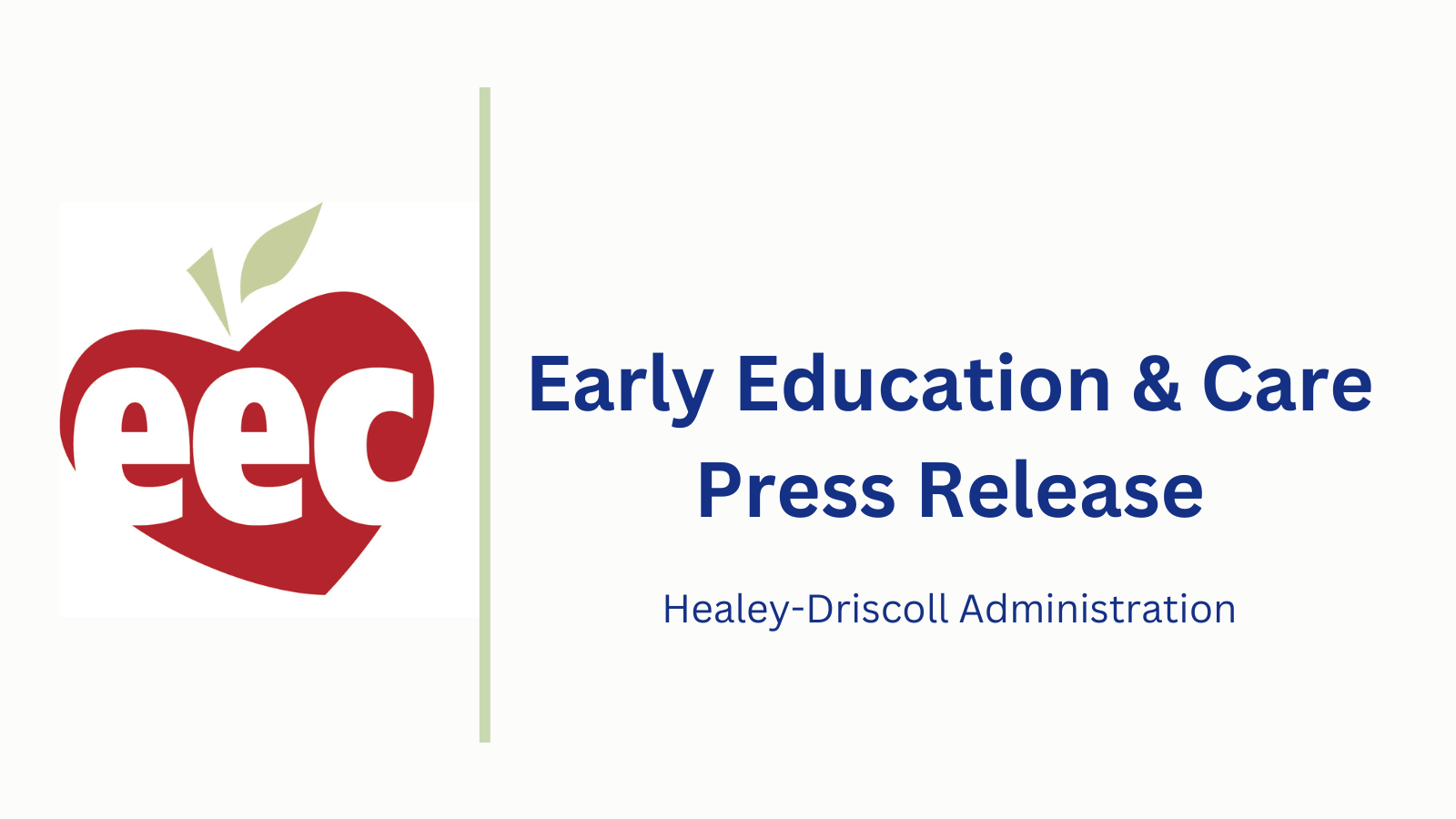- Department of Early Education and Care
- Executive Office of Education
Media Contact
Alana Davidson, Director of Communications

Boston — The Healey-Driscoll Administration announced today that the Department of Early Education and Care (EEC) has posted two requests for responses (RFRs) for early education and care programs that will invest an estimated $400 million a year to provide care for approximately 20,000 children eligible for child care financial assistance. EEC is updating and re-procuring these services for the first time since 2009, which will improve the customer service experience for families, strengthen and align educator staffing and training requirements across programs, improve performance monitoring and effectiveness, and continue efforts to simplify rates for providers.
The re-procurements purchase high-quality early education and out-of-school time care through contracted seats in center-based and family child care (FCC) programs. One RFR focuses on families who are income eligible for child care financial assistance. The second one focuses on “priority populations” that includes families experiencing homelessness, young parents, and families working with the Department of Children and Families (DCF). Awardees provide financial assistance, direct child care, and social services that support the needs of the whole family.
“Our administration is the first to reprocure these child care services in 15 years, continuing our work to break down barriers for low-income families and early education programs and make government services more user friendly and equitable,” said Governor Maura Healey. “In Massachusetts, making child care more affordable and accessible is a top priority. I thank the Legislature for their partnership in making historic investments in early education and care this fiscal year and look forward to working with them on continuing these efforts in fiscal year 2025.”
“We know that the high cost of child care is one of the biggest burdens facing Massachusetts families. That’s why we’re focused on making it more affordable and equitable for families,” said Lieutenant Governor Kim Driscoll. “Once awarded, these updated contracts will improve our child care financial assistance system for early education providers, children and families, helping our hardworking providers deliver the high-quality care that our littlest learners need and deserve in the communities where they live, learn and play.”
EEC’s goals for these re-procurements focus on centering the family voice and restructuring requirements to continue to modernize and improve the experience for parents and providers. Some of the key changes include:
- Incorporating clearly defined customer service and communication expectations to ensure all families have a respectful and consistent experience.
- Instituting consistent staffing expectations for early education and care programs and umbrella agency staff.
- Setting training and professional development criteria for programs and staff to ensure that all programs are equipped with the experience necessary to serve and meet the needs of children and their families.
- Introducing Key Performance Indicators (KPIs) and a collaborative approach to monitor performance, program effectiveness, and compliance with core service requirements.
- Making transportation services a separate critical supportive service for priority population contracts, reimbursing providers for each child receiving transportation through the contract. This creates a daily per-child transportation rate for all priority population families, separating it from other support services.
“Through this re-procurement, the administration has an opportunity to transform how our child care financial assistance system works for contracted early education and care providers, as well as the experience for families accessing financial assistance and care. These changes reflect our values in centering equity, providing high-quality learning experiences for children, and enabling a respectful and dignified experience for families,” said Secretary of Education Dr. Patrick Tutwiler.
“Our child care financial assistance programs are a critical tool to expanding access and affordability for families. Our work to implement improved contracts builds on the significant regulation and policy reforms we rolled out in the fall and transformative changes to our rates approved by the Board of Early Education and Care in January. Together, all of these efforts aim to make it easier for providers to administer child care financial assistance, attracting more providers to participate in the state’s system,” said Early Education and Care Commissioner Amy Kershaw.
“Child care provided through EEC ensures children involved with the Department of Children and Families (DCF) receive early education in a safe, nurturing environment,” said Acting DCF Commissioner Staverne Miller. “We appreciate our partnership with EEC and the investments made by the administration to create a strong educational foundation for future success. For parents and caregivers, accessible child care provides comfort and reassurance that children are well-cared for while receiving an education.”
Child care financial assistance is provided to families through contracts with providers to secure a set number of seats for families, and vouchers which are portable and families can use at any program that accepts child care financial assistance. The state’s programs are funded federally through the Child Care and Development Fund (CCDF) and by the state through multiple EEC line items. This fiscal year, the Healey-Driscoll administration and the Legislature delivered $778 million towards child care financial assistance, an increase of $60 million over FY23. Governor Healey’s FY25 budget proposal increases funding by another $154 million, investing $914 million in child care financial assistance next fiscal year.
In October, the Administration implemented significant improvements to the state’s Child Care Financial Assistance programs that simplify the application process for parents, reduce paperwork for families and early education programs, and better support homeless families, families with disabilities and families facing domestic violence. This January, the Board of Early Education and Care unanimously approved the Administration’s transformative changes to how the state reimburses providers who accept state child care financial assistance, known as rates. The approved rates not only increase funding for all providers, but also make significant progress on addressing long-standing inequities in rate amounts by geographic region and age group of children served.
###
